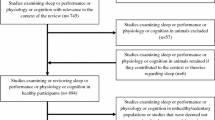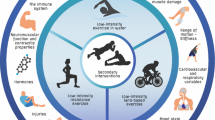Abstract
Purpose
The current study investigated the effect of caffeine on the breathing pattern during a high-intensity whole-body exercise.
Methods
Using a randomized, crossover, counterbalanced, and double-blind design, twelve healthy men ingested either 5 mg.kg−1 of caffeine or cellulose (placebo) one hour before performing a high-intensity whole-body exercise (i.e., work rate corresponding to 80% of the difference between the gas exchange threshold and maximal oxygen uptake) until the limit of tolerance. Ventilatory and metabolic responses were recorded throughout the trial and at task failure.
Results
Caffeine ingestion increased time to task failure in relation to the placebo (368.1 ± 49.6 s vs. 328.5 ± 56.6 s, p = 0.005). Caffeine also increased tidal volume and inspiratory time throughout the exercise (p < 0.05). Compared to task failure with placebo, task failure with caffeine intake was marked by higher (p < 0.05) minute ventilation (134.8 ± 16.4 vs. 147.6 ± 18.2 L.min−1), the ventilatory equivalent of oxygen consumption (37.8 ± 4.2 vs. 41.7 ± 5.5 units), and respiratory exchange ratio (1.12 ± 0.10 vs. 1.19 ± 0.11 units).
Conclusion
In conclusion, ingestion of caffeine alters the breathing pattern by increasing tidal volume and lengthening the inspiratory phase of the respiratory cycle. These findings suggest that caffeine affects the ventilatory system, which may account, in part, for its ergogenic effects during high-intensity whole-body exercises.


Similar content being viewed by others
References
Amann M (2012) Pulmonary system limitations to endurance exercise performance in humans. Exp Physiol 97(3):311–318. https://doi.org/10.1113/expphysiol.2011.058800
Amann M, Gregory MB, Lester T et al (2010) Group III and IV muscle afferents contribute to ventilatory and cardiovascular response to rhythmic exercise in humans. J Appl Physiol 109(4):966–976. https://doi.org/10.1152/japplphysiol.00462.2010
Astorino TA, Trisha C, Andrea TL et al (2012) Increases in cycling performance in response to caffeine ingestion are repeatable. Nutr Res 32(2):78–84. https://doi.org/10.1016/j.nutres.2011.12.001
Becker AB, Keith JS, Catherine AG et al (1984) The bronchodilator effects and pharmacokinetics of caffeine in asthma. N Engl J Med 310(12):743–746
Bell DG, Jacobs I, Zamecnik J (1999) Effects of caffeine, ephedrine and their combinations on time to exhaustion during high-intensity exercise. Eur J Appl Physiol Occup Physiol 79(4):379–380. https://doi.org/10.1007/s004210050524
Bergstrom HC, Terry JH, Jorge MZ et al (2013) The relationships among critical power determined from a 3-min all-out test, respiratory compensation point, gas exchange threshold, and ventilatory threshold. Res Q Exerc Sport 84(2):232–238. https://doi.org/10.1080/02701367.2013.784723
Black CD, Dwight EW, Alexander RG (2015) Caffeine’s ergogenic effects on cycling: neuromuscular and perceptual factors. Med Sci Sports Exerc 47(6):1145–1158. https://doi.org/10.1249/MSS.0000000000000513
Black MI, Andrew MJ, Jamie RB et al (2017) Muscle metabolic and neuromuscular determinants of fatigue during cycling in different exercise intensity domains. J Appl Physiol 122(3):446–459. https://doi.org/10.1152/japplphysiol.00942.2016
Bowtell JL, Magni M, Jonathan F et al (2018) Improved exercise tolerance with caffeine is associated with modulation of both peripheral and central neural processes in human participants. Front Nutr. https://doi.org/10.3389/fnut.2018.00006
Butler JE (2007) Drive to the human respiratory muscles. Respir Physiol Neurobiol 159(2):115–126. https://doi.org/10.1016/j.resp.2007.06.006
Butler JE, Gandevia SC (2008) The output from human inspiratory motoneurone pools. J Physiol 586(5):1257–1264. https://doi.org/10.1113/jphysiol.2007.145789
Chapman RF, Mickleborough TD (2009) The effects of caffeine on ventilation and pulmonary function during exercise: an often-overlooked response. Phys Sportsmed 37(4):97–103. https://doi.org/10.3810/psm.2009.12.1747
Chapman RF, Stager JM (2008) Caffeine stimulates ventilation in athletes with exercise-induced hypoxemia. Med Sci Sports Exerc 40(6):1080–1086. https://doi.org/10.1249/MSS.0b013e3181667421
Cohen J (2013) Statistical Power Analysis for the Behavioral Sciences. Academic press
D’Urzo AD, Jhirad R, Jenne H et al (1990) Effect of caffeine on ventilatory responses to hypercapnia, hypoxia, and exercise in humans. J Appl Physiol 68(1):322–328. https://doi.org/10.1152/jappl.1990.68.1.322
Dempsey JA (2019) Respiratory determinants of exercise limitation: focus on phrenic afferents and the lung vasculature. Clin Chest Med 40(2):331–342. https://doi.org/10.1016/j.ccm.2019.02.002
Dempsey JA, Wagner PD (1999) Exercise-induced arterial hypoxemia. J Appl Physiol 87(6):1997–2006. https://doi.org/10.1177/153857449803200307
Dubois M, Chenivesse C, Raux M et al (2016) Neurophysiological evidence for a cortical contribution to the wakefulness-related drive to breathe explaining hypocapnia-resistant ventilation in humans. J Neurosci 36(41):1673–1682. https://doi.org/10.1523/JNEUROSCI.2376-16.2016
Duffin J, Ravi MM, Paris V et al (2000) A model of the chemoreflex control of breathing in humans: model parameters measurement. Respir Physiol 120(1):13–26. https://doi.org/10.1016/S0034-5687(00)00095-5
Faul F, Erdfelder E, Lang AG et al (2007) G* power 3: a flexible statistical power analysis program for the social, behavioral, and biomedical sciences. Behav Res Methods 39(2):175–191
Forster HV, Haouzi P, Dempsey JA (2012) Control of breathing during exercise. Compr Physiol 2(1):743–777. https://doi.org/10.1002/cphy.c100045
Fujii N, Fujimoto T, Yinhang C et al (2021) Caffeine exacerbates hyperventilation and reductions in cerebral blood flow in physically fit men exercising in the heat. Med Sci Sports Exerc 53(4):845–852. https://doi.org/10.1249/mss.0000000000002537
Glaister M, Pattison JR, Muniz-Pumares D et al (2015) Effects of dietary nitrate, caffeine, and their combination on 20-km cycling time trial performance. J Strength Cond Res 29(1):165–174
Gonçalves LS, Painelli VS, Yamaguchi G et al (2017) Dispelling the myth that habitual caffeine consumption influences the performance response to acute caffeine supplementation. J Appl Physiol 123(1):213–220. https://doi.org/10.1152/japplphysiol.00260.2017
Graham RY, Delpierre JS, Grimaud C et al (1986) The effects of ischemia, lactic acid and hypertonic sodium chloride on phrenic afferent discharge during spontaneous diaphragmatic contraction. Neurosci Lett 67(3):257–262. https://doi.org/10.1016/0304-3940(86)90318-6
Green JM, Olenick A, Eastep C (2017) Caffeine influences cadence at lower but not higher intensity RPE-regulated cycling. Physiol Behav 169:46–51. https://doi.org/10.1016/j.physbeh.2016.11.007
Grgic J, Grgic I, Pickering C et al (2019) Wake up and smell the coffee: caffeine supplementation and exercise performance - an umbrella review of 21 published meta-analyses. Br J Sports Med. https://doi.org/10.1136/bjsports-2018-100278
Guenette JA, Witt JD, McKenzie DC et al (2007) Respiratory mechanics during exercise in endurance-trained men and women. J Physiol 581(3):1309–1322. https://doi.org/10.1113/jphysiol.2006.126466
Jackson AS, Pollock ML (1978) Generalized equations for predicting body density of men. Br J Nutr 40(03):497. https://doi.org/10.1079/BJN19780152
Jamnick NA, Pettitt RW, Granata C et al (2020) An examination and critique of current methods to determine exercise intensity. Sports Med 0123456789:1–28. https://doi.org/10.1007/s40279-020-01322-8
Johnson BY, Bruce D, Babcock MA et al (1993) Exercise-induced diaphragmatic fatigue in healthy humans. J Physiol 460:385–405
Kalmar JM, Cafarelli E (2004) Central fatigue and transcranial magnetic stimulation: effect of caffeine and the confound of peripheral transmission failure. J Neurosci Methods 138(1–2):15–26. https://doi.org/10.1016/j.jneumeth.2004.03.006
LeMessurier DH (1936) The site of action of caffeine as a respiratory stimulant. J Pharmacol Exp 57(4):458–463
Lima-silva AE, Cristina-souza G, Silva-cavalcante M et al (2021) Caffeine during high-intensity whole-body exercise: an integrative approach beyond the central nervous system. Nutrients 13:1–15
Magkos F, Kavouras SA (2005) Caffeine use in sports, pharmacokinetics in man, and cellular mechanisms of action. Crit Rev Food Sci Nutr 45(7–8):535–562. https://doi.org/10.1080/1040-830491379245
Mahamed S, Ali AF, Ho D et al (2001) The contribution of chemoreflex drives to resting breathing in man. Exp Physiol 86(1):109–116. https://doi.org/10.1113/eph8602090
Marcora SM, Bosio A, Morree HM (2008) Locomotor muscle fatigue increases cardiorespiratory responses and reduces performance during intense cycling exercise independently from metabolic stress. Am J Physiol Regul Integr Comp Physiol 294(3):874–883. https://doi.org/10.1152/ajpregu.00678.2007
Mateika JH, Duffin J (1995) A review of the control of breathing during exercise. Eur J Appl Physiol Occup Physiol 71(1):1–27. https://doi.org/10.1007/BF00511228
Meeusen R, Roelands B, Spriet LL (2013) Caffeine, exercise and the brain. Nestle Nutr Inst Workshop Ser 76:1–12. https://doi.org/10.1159/000350223
Morrell MJ, Shea SA, Adams L et al (1993) Effects of inspiratory support upon breathing in humans during wakefulness and sleep. Respir Physiol 93(1):57–70. https://doi.org/10.1016/0034-5687(93)90068-L
Nair J, Streeter KA, Sara MF et al (2017) Anatomy and physiology of phrenic afferent neurons. J Neurophysiol 118(6):2975–2990. https://doi.org/10.1152/jn.00484.2017
Nicks CR, Martin EH (2020) Effects of caffeine on inspiratory muscle function. Eur J Sport Sci 20(6):813–818. https://doi.org/10.1080/17461391.2019.1675767
Nicolò A, Sacchetti M, Girardi M et al (2019) A comparison of different methods to analyse data collected during time-to-exhaustion tests. Sport Sci Health 15(3):667–679. https://doi.org/10.1007/s11332-019-00585-7
Niekamp K, Zavorsky GS, Fontana L et al (2012) Systemic acid load from the diet affects maximal-exercise RER. Med Sci Sports Exerc 44(4):709–715. https://doi.org/10.1249/MSS.0b013e3182366f6c
Pires FO, Anjos CAS, Roberto JM et al (2018) Caffeine and placebo improved maximal exercise performance despite unchanged motor cortex activation and greater prefrontal cortex deoxygenation. Front Physiol. https://doi.org/10.3389/fphys.2018.01144
Powers SCOTTK, Dodd STEPHEN, Woodyard JAMES, Mangum MICHAEL (1986) Caffeine alters ventilatory and gas exchange kinetics during exercise. Med Sci Sports Exerc 18(1):101–106
Robergs RA, Ghiasvand F, Parker D et al (2004) Biochemistry of exercise-induced metabolic acidosis. A Am J Physiol Regul Integr Comp Physiol 287(356–3):502–516. https://doi.org/10.1152/ajpregu.00114.2004
Romer LM, Polkey MI (2008) Exercise-induced respiratory muscle fatigue: implications for performance. J Appl Physiol 104(3):879–888. https://doi.org/10.1152/japplphysiol.01157.2007
Saboisky JP, Gorman RB, Troyer A et al (2007) Differential activation among five human inspiratory motoneuron pools during tidal breathing. J Appl Physiol 102(2):772–780. https://doi.org/10.1152/japplphysiol.00683.2006
Saunders B, Oliveira LF, Silva RP et al (2017) Placebo in sports nutrition: a proof-of-principle study involving caffeine supplementation. Scand J Med Sci Sports 27(11):1240–1247. https://doi.org/10.1111/sms.12793
Sheel AW, Guenette JA (2008) Mechanics of breathing during exercise in men and women: sex versus body size differences? Exerc Sport Sci Rev 36(3):128–134. https://doi.org/10.1097/JES.0b013e31817be7f0
Sheel AW, Romer LM (2012) Ventilation and respiratory mechanics - comprehensive physiology. Compr Physiol 2(April):1093–1142. https://doi.org/10.1002/cphy.100046
Silveira R, Andrade-Souza VA, Arcoverde L et al (2018) Caffeine increases work done above critical power, but not anaerobic work. Med Sci Sports Exerc 50(1):131–140. https://doi.org/10.1249/MSS.0000000000001408
Siri W (1961) Body composition from fluids spaces and density: analysis of methods. Nutrition 223–24.
Soós R, Gyebrovszki A, Tóth Á et al (2021) Effects of caffeine and caffeinated beverages in children short review. Int J Environ Res Public Health Adolesc Young Adults. https://doi.org/10.3390/ijerph182312389
Southward K, Rutherfurd-Markwick KJ, Ali A (2018) The effect of acute caffeine ingestion on endurance performance: a systematic review and meta-analysis. Sports Med 48(8):1913–1928. https://doi.org/10.1007/s40279-018-0939-8
Supinski GS, Levin S, Kelsen SG (1986) Caffeine effect on respiratory muscle endurance and sense of effort during loaded breathing. J Appl Physiol 60(6):2040–2047. https://doi.org/10.1152/jappl.1986.60.6.2040
Temple JL, Ziegler AM (2011) Gender differences in subjective and physiological responses to caffeine and the role of steroid hormones. J Caffeine Res 1(1):41–48. https://doi.org/10.1089/jcr.2011.0005
Whipp BJJA, Torres DF, Wasserman K (1981) A test to determine parameters of aerobic function during exercise. J Appl Physiol Respir Environ Exerc Physiol 50(1):217–221. https://doi.org/10.1152/jappl.1981.50.1.217
Wylegala JA, Pendergast DR, Gosselin LE et al (2007) Respiratory muscle training improves swimming endurance in divers. Eur J Appl Physiol 99(4):393–404. https://doi.org/10.1007/s00421-006-0359-6
Acknowledgements
Lima-Silva is grateful for his scholarship from the National Council for Scientific and Technological Development (grant 301340/2019-6). This study was financed in part by the Coordenação de Aperfeiçoamento de Pessoal de Nível Superior—Brasil (CAPES)—Finance Code 001.
Funding
No funding was reported by the author(s).
Author information
Authors and Affiliations
Contributions
AHM, GC-S, and AEL-S conceived and designed research; GC-S, PSS, ACS-M, and AEL-S performed experiments; AHM, GC-S, PSS, and AEL-S analyzed data; AHM, GC-S, PSS, RB, and AEL-S interpreted results of experiments; AHM, GC-S, PSS, and AEL-S prepared figures; AHM and AEL-S drafted the manuscript; AHM, GC-S, PSS, ACS-M, AR, FRD-O, RB, and AEL-S edited and revised the manuscript; AHM, GC-S, PSS, ACS-M, AR, FRD-O, RB, and AEL-S approved the final version of the manuscript.
Corresponding author
Ethics declarations
Conflict of interest
No potential conflict of interest/Competing interests was reported by the author(s).
Availability of data and material
Not applicable.
Additional information
Communicated by Guido Ferretti.
Publisher's Note
Springer Nature remains neutral with regard to jurisdictional claims in published maps and institutional affiliations.
Rights and permissions
About this article
Cite this article
Marinho, A.H., Cristina-Souza, G., Santos, P.S. et al. Caffeine alters the breathing pattern during high-intensity whole-body exercise in healthy men. Eur J Appl Physiol 122, 1497–1507 (2022). https://doi.org/10.1007/s00421-022-04934-2
Received:
Accepted:
Published:
Issue Date:
DOI: https://doi.org/10.1007/s00421-022-04934-2




